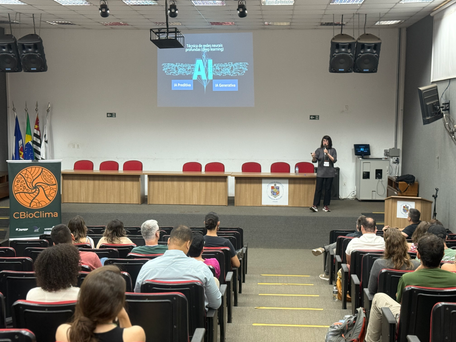1st Meeting of Young Scientists – CBioClima
- cbioclimamidia

- Nov 26, 2025
- 3 min read
by: Gabriela Andrietta
The first day of the 1st Young Scientists Meeting, held on November 26th and 27th, brought together young researchers for discussions and the exchange of experiences. The initiative, promoted by the Center's Integration Coordination, consolidates a safe, plural, and collaborative space for postdoctoral researchers and technical training participants linked to CBioClima (Center for Research in Biodiversity and Climate Change).
Opening: welcoming, mission, and belonging
Professor Patrícia Morellato, director of CBioClima, opened the meeting reinforcing the importance of dialogue and integration among the participants. Following her, Professor Maurício Bacci, vice-director, highlighted the strategic role of research, scientific dissemination, and innovation in advancing knowledge and strengthening the Center.
The Integration Coordinator, Professor Tadeu Siqueira, introduced the new coordination team, responsible for creating this first meeting, emphasizing the importance of ensuring that young researchers do not feel isolated in their activities. He presented the structure of CBioClima, its Work Packs, organizational chart, and its operation, highlighting the complexity and excellence of Cepid (Research, Innovation and Dissemination Center). Tadeu also presented the coordination's mission: to strengthen connections, create support networks, and promote continuous actions aimed at participants. He explained that the meeting was conceived without a specific theme and without the participation of principal researchers, to guarantee a safe space for dialogue and expression.
The event's Organizing Committee is formed by Alan Cerqueira, Ariadne Sabbag, Bruna Alberton, Caio Ballarin, Carolina Medeiros, Fábio de Sá, and Saura Silva, who dedicated themselves to the planning and coordination of all project activities.
Artificial Intelligence, Society, and the Environment
Guest speaker Dora Kaufman, a professor at PUC-SP, presented the lecture "Artificial Intelligence as an Ally or Enemy of Nature". She addressed the paradox of Artificial Intelligence for the environment: while it enables significant advances in research and conservation, it also generates risks and impacts.
Dora explained that AI is capable of processing large volumes of data, improving techniques, and reducing the time required to perform tasks, allowing for climate predictions, identifying patterns and anomalies, optimizing processes, supporting diagnoses, and monitoring ecosystems. These resources make the technology an important ally in mitigating climate change and conserving biodiversity.
However, the researcher warned about the high consumption of energy and drinking water associated with AI systems, which generates a high environmental impact. Furthermore, she highlighted that the AI we use is in its early stages and does not approach the complexity of the human brain. "What we call AI are statistical models based on correlations," she stated.
The professor presented the differences between predictive AI (which makes predictions and has a specific system for each task) and generative AI (which uses the same technique, but in addition to prediction, generates content such as text, images, videos, and code).
According to her, most current implementations come from machine learning techniques. Deep neural networks identify patterns and assign statistical weights (parameters) to the data, making correlations. Generative AI learning establishes a hierarchy of the frequency with which those words are correlated. This logic can generate phenomena such as hallucinations, when the system produces answers that, although they seem plausible, are incorrect.
AI is an auxiliary technology that generates content based on data. But this data is produced by human society. Innovation, therefore, remains exclusively human. "It's an extraordinary technology. It's more than a technology; it impacts our functioning and may be interfering with our cognition and the way we think." But it has limitations and does not produce knowledge. “Innovation and creativity are still restricted to human beings,” added Kaufman.
Integration Activities
After the break, participants held flash talks, introducing themselves and sharing their research topics. In the afternoon, the letter “The Postdoctoral Researcher in Brazil” was created collectively by the postdoctoral fellows and fellows of the Center.


























Comments